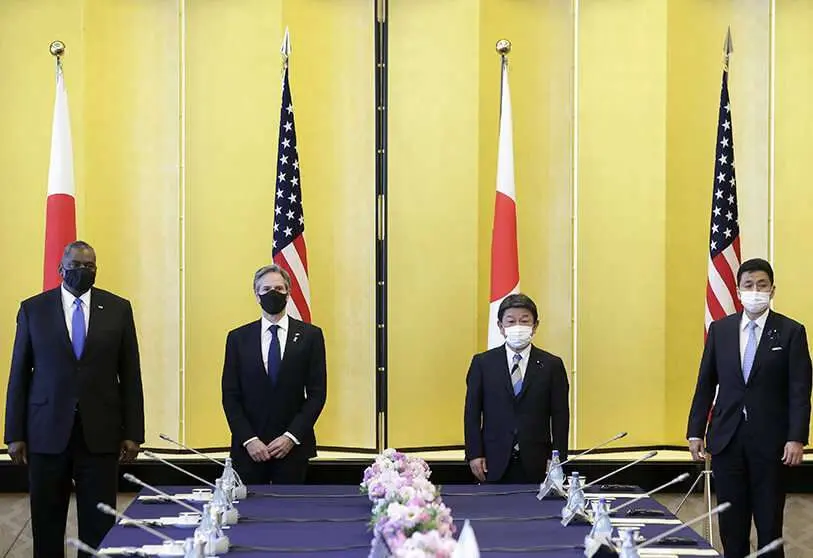The Biden administration strengthens its foreign relations in the Asia-Pacific region

In its first moves, Biden's new presidency is opting for a foreign policy focused on containing the Chinese giant and strengthening diplomatic relations with neighbouring countries in the Asian region. Along these lines, the concern shared by the Japanese and US authorities over the growth of Chinese influence in the Indo-Pacific region has led the head of Defence, Lloyd Austin, and the Secretary of State, Antony Blinken, to engage in what would be the new US Administration's first talks with their Japanese counterparts.
The defence secretary arrived in Japan on Monday, while Secretary of State Antony Blinken will join him in Tokyo this week to reaffirm Washington's commitment to the region and the alliance between the two countries, following Trump's foreign policy with Japan based on coordination and "mutual trust".

The trip is intended as a sign of the importance President Biden attaches to the alliance with his two closest allies in the Far East, Japan and South Korea, in the face of China's increasingly expansionist policies.
Aiming to resume his presence in the Asia-Pacific region, US President Joe Biden held a virtual summit of leaders from Australia, Japan, India and the United States on Friday, reiterating his commitment to the region. This meeting aims to contain China's power and influence in the region.

These Quad countries are experiencing growing tension with the Asian giant: the United States is fighting the great trade battle with China, despite the change of administration, and has increased its air and naval missions in the South China Sea. On the other hand, India and Japan are at various points of tension over Beijing's role in claiming sovereignty over some territories in Pakistan that it disputes with India and which the country accuses China of illegally occupying. On the other hand, Australia has been experiencing three straight years of diplomatic differences with China following the imposition of tariffs on several products from the southern country.
As such, the new government's first official overseas trip by secretaries is focused on strengthening its commitments in the region, as well as curbing China's strong influence. Blinken and Austin are also expected to address the COVID-19 pandemic and climate change, as well as the nuclear threat posed by North Korea and the situation in Myanmar after the military coup.

During the diplomats' stay in Tokyo, they are expected to hold virtual meetings with business leaders and members of civil society before heading to South Korea, a key ally in the region.
Biden's presidency thus differs from Trump's foreign policy after Saudi Arabia was the first official trip the Republican president visited. On his first trip, Trump held a meeting with King Salman bin Abdulaziz to call for unity in the fight against jihadism in the Muslim world, describing the challenge as "a battle between good and evil" and appealing to Arab leaders to "expel terrorists from their temples of prayer".

In terms of influence in the Asia-Pacific, Trump was the first president to speak of a new rhetoric towards China, calling China a rival rather than a partner.
On the other hand, Barack Obama's foreign policy was characterised by an attempt to isolate China through the Trans-Pacific Partnership agreement that most of its neighbours had signed up to and which Trump cancelled during his first week as president.

With this rebalancing policy, Obama tried to seek the greatest number of allies in the region in order to exercise effective containment against his greatest enemy in the region, China. However, the Trump administration could be characterised by a loss of leadership in this part of the region, an area of great economic and commercial interest not only for the US, but for the whole world.
The former Republican president pursued an aggressive policy against China, especially in the area of trade, accusing China of unfair competition and currency manipulation, which, according to the president, contributed to the destruction of thousands of jobs in the United States.

In his relations with North Korea, Donald Trump pursued a firm policy focused on denuclearising North Korea, but rising tensions have led him to maintain policies of deterrence.
Similarly, Biden has not yet clarified his approach to North Korea and his administration is currently in talks with former officials on how best to respond to the threat posed by North Korea's nuclear programme.
A senior US official revealed to the press on Saturday that the Democratic administration has tried to contact North Korea through various means, including its mission to the United Nations, but has been unsuccessful in receiving no response. At present, the United States has not heard from North Korea for a year.










